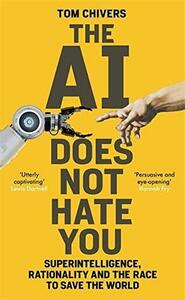Take a photo of a barcode or cover
13 reviews for:
The AI Does Not Hate You: Superintelligence, Rationality and the Race to Save the World
Tom Chivers
13 reviews for:
The AI Does Not Hate You: Superintelligence, Rationality and the Race to Save the World
Tom Chivers
Like the author, I'm sympathetic to, but not really part of, the "rationalist" community. Not many of the ideas discussed here were new to me, but it was interesting to get a bit more historical context about the group.
challenging
hopeful
informative
reflective
medium-paced
informative
inspiring
reflective
fast-paced
funny
hopeful
informative
inspiring
reflective
fast-paced
hopeful
informative
inspiring
reflective
fast-paced
challenging
informative
reflective
medium-paced
I found this book to be an interesting but somewhat difficult read. Parts of the book felt quite informationally dense, making it harder to put down and dive back into.
Despite the title, the book only half focuses on AI safety, with much of the rest of the book covering the community that helped bring AI safety into the mainstream. That's not to say the topic shift is without merit, and for anyone unfamiliar with the Rationalist movement gives an interesting introduction. On the flip side, the introduction to the Rationalists is also a largely sympathetic take and although touches on some of the more controversial criticisms of the movement largely dismisses them.
If you're interested in AI or AI safety and its modern history, this book gives a good jumping off point.
Despite the title, the book only half focuses on AI safety, with much of the rest of the book covering the community that helped bring AI safety into the mainstream. That's not to say the topic shift is without merit, and for anyone unfamiliar with the Rationalist movement gives an interesting introduction. On the flip side, the introduction to the Rationalists is also a largely sympathetic take and although touches on some of the more controversial criticisms of the movement largely dismisses them.
If you're interested in AI or AI safety and its modern history, this book gives a good jumping off point.
A previous review mentioned that Gwern makes a cameo. TBH, this was what I was most excited about because he seems like a fascinating character who I'd like to learn more about. Unfortunately, he was only mentioned once, so I didn't learn anything about him. I already knew most of the content of this book, but here's the few things which were new to me:
* A disproportionate number of Tetlock's superforcasters came from Lesswrong
* Story about a rationalist woman who is considering having a baby, so starts carrying a robot baby around to get a sense of what the disruptions to her life would be like so she can make a more informed decision.
* Strategy for efficiently splitting bills: randomly generate a number from 0 to the total, then run a cumulative sum down the bill, and whoevers meal is on the random number has to pay for everything. Thus only one person pays and on average you pay for what you order.
* A disproportionate number of Tetlock's superforcasters came from Lesswrong
* Story about a rationalist woman who is considering having a baby, so starts carrying a robot baby around to get a sense of what the disruptions to her life would be like so she can make a more informed decision.
* Strategy for efficiently splitting bills: randomly generate a number from 0 to the total, then run a cumulative sum down the bill, and whoevers meal is on the random number has to pay for everything. Thus only one person pays and on average you pay for what you order.


